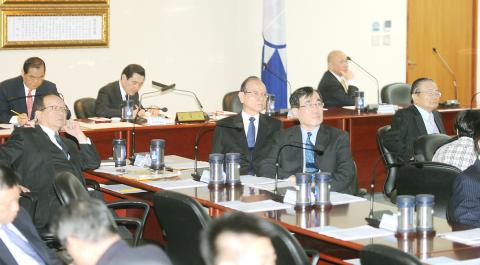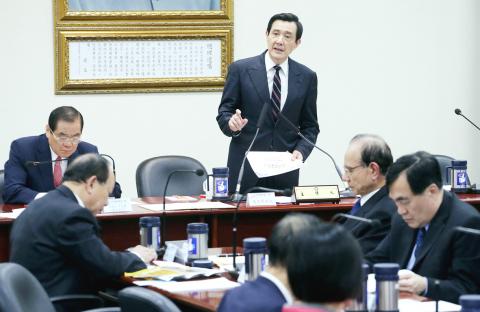President Ma Ying-jeou (馬英九), who also serves as Chinese Nationalist Party (KMT) chairman, yesterday nominated Taipei Mayor Hau Lung-bin (郝龍斌), New Taipei City Mayor Eric Chu (朱立倫) and Greater Taichung Mayor Jason Hu (胡志強) as the party’s vice chairmen.
The nominations were approved during a meeting of the KMT Central Standing Committee yesterday afternoon, after three of the six incumbent KMT vice chairmen — Lin Feng-cheng (林豐正), Chan Chun-po (詹春柏) and John Chiang (蔣孝嚴) — tendered their resignations recently.
The personnel reshuffle was touted as part of the KMT’s endeavor to reform the party following the conclusion of the 24-day student-led Sunflower movement, which occupied the legislature to protest against the KMT caucus and the Ma administration’s handling of the cross-strait service trade agreement last month.

Photo: Fang Pin-chao, Taipei Times
“The KMT and the nation are facing an enormous challenge right now. Since the heads of local governments have a better grasp of public opinion, [serving as KMT vice chairmen] will allow us to better express the opinions of the people to the higher echelons of the party and therefore help them formulate better policies,” Hau said on the sidelines of a press conference for sheltered workshops in Taipei yesterday.
“We should shoulder the responsibility together and do our utmost to assist the party,” Hau said.
When asked for comment, Chu said Ma informed him of the nominations on Tuesday night and the president expressed hope that the trio would serve as a bridge between the party and the people after they assume their roles.

Photo: CNA
However, Chu dismissed speculations linking the personnel change to the party’s strategic plans for the 2016 presidential election, saying: “It is only meant to facilitate better communication between local governments and the administrative and legislative branches of the government.”
Hu said that although he had previously said that he had no intention of taking over as KMT vice chairman, he accepted the nomination because “every KMT member is obliged to unite to save the party in a time of crisis.”
“I will do everything in my power to be a vice chairman who serves as the voice of the people and bring improvements to the party,” Hu said.
Most KMT members welcomed the decision.
KMT Legislator Lin Tsang-min (林滄敏) said the three incoming chairmen’s administrative experience was an asset to the KMT because it would help the party with its policymaking.
KMT Legislator Chi Kuo-tung (紀國棟) said that while Chan, Chiang and Lin Feng-cheng were highly respected in the KMT, it was better to have someone who could represent the party and carry out certain functions to serve as the party’s vice chairmen.
“The nominations should have been made long ago,” Chi said.
However, some Democratic Progressive Party (DPP) lawmakers disapproved of the nominations.
DPP Legislator Lee Chun-yi (李俊俋) was quoted by the Chinese-language Apple Daily as saying that Ma’s motive for designating the trio as party vice chairmen was to consolidate his power and to silence their criticism against the party and the government.
DPP Legislator Huang Wei-cher (黃偉哲) was quoted as saying that the nominations were a ploy by Ma to tame his enemies and that the trio might have only accepted the offer to avoid being alienated by the president.
“Ma previously offered the vice chairman position to Legislative Speaker Wang Jin-pyng (王金平). Wang declined, and Ma has treated him as a sworn enemy ever since,” Huang said.

Alain Robert, known as the "French Spider-Man," praised Alex Honnold as exceptionally well-prepared after the US climber completed a free solo ascent of Taipei 101 yesterday. Robert said Honnold's ascent of the 508m-tall skyscraper in just more than one-and-a-half hours without using safety ropes or equipment was a remarkable achievement. "This is my life," he said in an interview conducted in French, adding that he liked the feeling of being "on the edge of danger." The 63-year-old Frenchman climbed Taipei 101 using ropes in December 2004, taking about four hours to reach the top. On a one-to-10 scale of difficulty, Robert said Taipei 101

A preclearance service to facilitate entry for people traveling to select airports in Japan would be available from Thursday next week to Feb. 25 at Taiwan Taoyuan International Airport, Taoyuan International Airport Corp (TIAC) said on Tuesday. The service was first made available to Taiwanese travelers throughout the winter vacation of 2024 and during the Lunar New Year holiday. In addition to flights to the Japanese cities of Hakodate, Asahikawa, Akita, Sendai, Niigata, Okayama, Takamatsu, Kumamoto and Kagoshima, the service would be available to travelers to Kobe and Oita. The service can be accessed by passengers of 15 flight routes operated by

Taiwanese and US defense groups are collaborating to introduce deployable, semi-autonomous manufacturing systems for drones and components in a boost to the nation’s supply chain resilience. Taiwan’s G-Tech Optroelectronics Corp subsidiary GTOC and the US’ Aerkomm Inc on Friday announced an agreement with fellow US-based Firestorm Lab to adopt the latter’s xCell, a technology featuring 3D printers fitted in 6.1m container units. The systems enable aerial platforms and parts to be produced in high volumes from dispersed nodes capable of rapid redeployment, to minimize the risk of enemy strikes and to meet field requirements, they said. Firestorm chief technology officer Ian Muceus said

MORE FALL: An investigation into one of Xi’s key cronies, part of a broader ‘anti-corruption’ drive, indicates that he might have a deep distrust in the military, an expert said China’s latest military purge underscores systemic risks in its shift from collective leadership to sole rule under Chinese President Xi Jinping (習近平), and could disrupt its chain of command and military capabilities, a national security official said yesterday. If decisionmaking within the Chinese Communist Party has become “irrational” under one-man rule, the Taiwan Strait and the regional situation must be approached with extreme caution, given unforeseen risks, they added. The anonymous official made the remarks as China’s Central Military Commission Vice Chairman Zhang Youxia (張又俠) and Joint Staff Department Chief of Staff Liu Zhenli (劉振立) were reportedly being investigated for suspected “serious